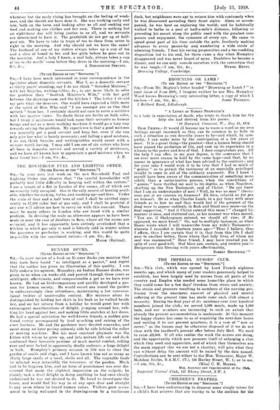RUNNER DUCKS.
(To THE EDITOR OF THE " SPECTATOR."] SIP.,—In your review of a book on Runner ducks you mention that they have been found " as intelligent as a parrot," and regret that the author has given no illustration of this quality. I can fully endorse his opinion. Humphry, an Indian Runner drake, was given to us when six weeks old, and proVed through three years as intelligent, affectionate, and companionable a pet as we have ever known. He had no bird-companions and quickly developed a pas- Ilion for human society. He would escort one round the garden in. embarrassingly close attendance, maintaining a low conversa- tional twitter of unutterable content. His mistress alone he distinguished by holding her skirt in his beak as he walked beside her, and on her return from a holiday he would greet her with extravagant manifestations of delight, jumping around her, rub- bing his head against her, and making little snatches at her dress. He had a special salutation for well-known friends, a sudden pro- found curtsy accompanied by loud quacking and raising of the crest feathers. He and the gardener were devoted comrades, and spent ninny an hour pacing solemnly side by side behind the roller or mowing machine. But his most constant playmate was the kitten with whom he grew up, and into mature life cat and duck continued their favourite pastime of mock mortal combat, rolling ever and over locked in apparently deadly embrace, a huge delight to both. Humphry's primary mission in life was to clear the garden of snails and slugs, and I have known him eat as many as thirty large snails at a meal, shells and all. The vegetable foods 1.e selected were invariably the treasures of the garden. Much had to he forgiven him, and no form of punishment was ever dis- covered that made the slightest impression on the culprit; he plainly took a droll delight in doing anything he had once clearly understood he was not desired to do. He loved to investigate the house, and would find his way in at any open door and straight to any room where lie heard human voices. Visitors grew accus- emed to being welcomed in the drawing-room by a vociferous
duck, but neighbours were apt to return him with-contumely when he was discovered ascending their front stairs. Alone or accom- panied, he was bent on exploring the world; and he habitually walked to bathe in a pool at half-a-mile's distance, following or preceding his escort along the public road with the greatest com- posure and enjoyment, the cynosure of every eye. He came to spend great part of his time outside the gate, fearlessly making advances to every passer-by and numbering a wide circle of admiring friends. I fear his roving propensities and a too confiding disposition led to his end, for there came a day when Humphry disappeared and was never heard of more. Doubtless he became a dinner, and we can only console ourselves with the conviction that


























 Previous page
Previous page